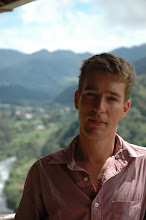Dodging Maoists In The Mountains
The second half of my stay in Nepal has been dominated by a nine-day trek in the Annapurna Region of the country. Graeme and I flew to Pokara which is a relaxed lakeside town nestling below the mountains and catering for a currently non-existent tourist industry centred around the most popular and spectacular trekking region in the World.
Our walk took us through fabulous mountain scenery from our start point at Naya Pul (1100m) to the top of the Thorung La Pass (5416m), the highest pass in the World. Technically we were following a trek known as the Jomsom Trek, which takes you to the joint Buddhist and Hindu temple complex at Mukinath, a pretty Tibetan village in the Lower Mustang region that juts northward of the Annapurna and is consequently a dry and arid region sitting above the monsoon belt. However, through hard and knackering walking we managed to get a day ahead ourselves to make an attempt on the Pass. Climbing from the western side is the difficult way to do it (though we didn't have a choice) and consists of a gruelling five and a half hour climb of over 1600m in increasingly thin air. We made it, though only after a lot of cursing and cussing on the way up, and posed for photos with jelly legs and mild headaches by the prayer flag decked sign at the top. This was quite honestly the hardest physical challenge I've ever undertaken, added to by the knee crushing impact of an immediate 1600m continuous descent straight back down to Mukinath.
Our party was actually comprised of three, as we were joined by a very chipper little dog who popped up out of nowhere beside the Mukinath Temple, and following a pat and coconut biscuit from Graeme, proceeded to accompany us all the way to the top and back down again. We named him 'Everest' in honour of this canine mountaineering expertise and he certainly looked a lot less bashed in by the experience than we did at the end. He mysteriously disappeared just as he had materialised outside the Temple. We wondered if he'd been some sort of guardian angel guiding us through snow and rain showers on the way up to enjoy the perfect sunshine and views at the top!
Earlier in the trek we had a close encounter with the Maoists who operate in the Annapurna Region, extracting 1200 rupee fees from trekkers to help fund their revolutionary activities. We were told they were very friendly provided you paid up, and would issue you with a receipt for you payment which was theoretically redeemable after the Revolution! A group of Maoists came into a village in which we were staying one evening, but we were out of sight upstairs in a teahouse hostel and they passed on unaware of our presence.
The Maoist problem is a symptom of a wider political malaise in Nepal which is all too apparent if you speak to the local people. In fact, the willingness and openess of the Nepalese in talking about the problems of their country has made my stay here all the more fascinating, and it contrasts greatly with the sealed lips of the people of Central Asia, China and Tibet on such matters. Essentially, there is very widespread and deep-seated resentment of the actions of a highly unpopular king who has revoked the constitution and imposed an autocratic form of Government in response to the heightening of tensions in the country. The Maoists, who have declared a unilateral three-month ceasefire in the past few days, represent only one wing of the opposition. A coalition of opposition parties clamouring for the restoration of multi-party democracy represent the voice of much of the people, and in Kathmandu there have been daily mass protests throughout the past week which have been met by a violent response from the riot police and many hundreds of arrests. It's not particularly effecting this Western tourist enclave of the city, but the papers are full of the stories, the locals complain bitterly of the king, and everywhere there are armed police and military checkpoints. There is some optimism here about the future thanks to the Maoist ceasefire, but the tragedy for Nepal is that the tourist industry which feeds so much of the economy is suffering catastrophically as a result of all this upheaval.


0 Comments:
Post a Comment
Subscribe to Post Comments [Atom]
<< Home